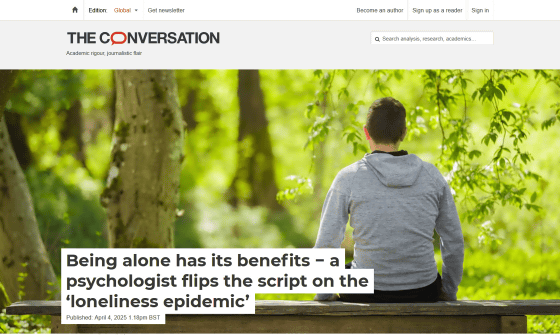Is 'loneliness' really a bad thing? A psychologist explains 'positive loneliness' that brings benefits to time alone

Many people have a negative impression of 'loneliness,' and research has shown that loneliness actually
Being alone has its benefits − a psychologist flips the script on the 'loneliness epidemic'
https://theconversation.com/being-alone-has-its-benefits-a-psychologist-flips-the-script-on-the-loneliness-epidemic-250742

Over the past few years, experts have been sounding the alarm that Americans are spending more time alone, with more people staying at home alone , eating alone at restaurants , and traveling alone . There is a strong recognition that loneliness is a serious social problem, as research has shown that chronic loneliness is associated with depression and shorter lifespan, and in 2023 the US Public Health Service declared a 'loneliness epidemic' (PDF file) .
However, loneliness does not necessarily lead to unhappiness. For some people, loneliness is associated with happiness, which some psychologists call ' positive loneliness .' Thomas, who has been studying 'why people like to spend time alone' for the past 10 years, says that he himself spends a lot of time alone and deeply understands the joy that solitude brings.
Research suggests there are many reasons why people prefer solitude, including to recharge their mental batteries , to grow personally , and to find time to connect emotionally and creatively .

A 2024
'This anxiety stems from an inadequate way in which our culture views loneliness,' Thomas says. 'With this type of thinking, the desire to be alone is seen as unnatural and unhealthy, something to be pitied or feared, rather than valued or encouraged.'
A study published in February 2025 found that American news headlines are 10 times more likely to portray being alone as a negative thing than a positive thing. This kind of bias also influences people's beliefs, and it has been shown that both adults and children have clear standards for when it is and is not acceptable for their peers to be alone.
American culture idealizes extroverted personality, valuing 'sociable, assertive, expressing positive emotions, and seeking more stimulation,' while risk-averse and introverted personalities are not highly valued. Of course, not all Americans are extroverted, but many are conditioned to develop extroverted traits, and people who grow up extroverted receive social rewards. Because of this cultural environment, there is a prejudice against preferring to spend time alone in the United States.
However, the desire for solitude is not pathological, nor is it exclusive to introverts. Furthermore, spending a lot of time alone does not necessarily mean one is socially isolated or lonely, and some research suggests that lonely older people are happier than people think.

Thomas is of the opinion that loneliness is not necessarily a bad thing, and that there is 'positive loneliness' that brings happiness to people, but he also points out that being socially isolated does not automatically mean you can enjoy the benefits of solitude. 'The benefits of solitude come when we are truly alone, when we consciously carve out the space and time to connect with ourselves, not when we are alone on our devices,' Thomas said.
Thomas' research has found that the positive effects of loneliness on happiness are diminished when most of that time is spent staring at a screen, especially when passively scrolling through social media. Social media is literally 'social' in nature, and when you're on it, you're not truly alone.
Our busy schedules make it hard to slow down and we feel anxious about looking away from screens and into ourselves. And if we don't accept that time alone is a normal, healthy human necessity, we end up feeling guilty and uncomfortable and wasting time alone.
Positive solitude is when you turn your attention inward, slowly reflect on yourself, and spend time prioritizing your own feelings, doing what you like, not what pleases others. Thomas claims that this kind of solitude can help you feel refreshed and rejuvenated , regain clarity of thought and emotional balance , and feel free and connected to yourself .
'It's true that too much social interaction can be taxing, and that overload can negatively impact the quality of our relationships. America's recent gravitas toward spending time alone may in part reflect a desire for more balance in lives that are often too busy, too scheduled and too social,' Thomas said.
In a culture as socially-conscious as America, the stigma surrounding spending time alone can be hard to shake, but research showing the benefits of solitude is slowly mounting. A 2025 study found that calling time spent alone 'me time' rather than 'loneliness' can actually lead to more positive feelings.
Research shows that calling time spent alone 'me time' instead of 'loneliness' can make you feel more positive - GIGAZINE

Related Posts:
in Science, Posted by log1h_ik






